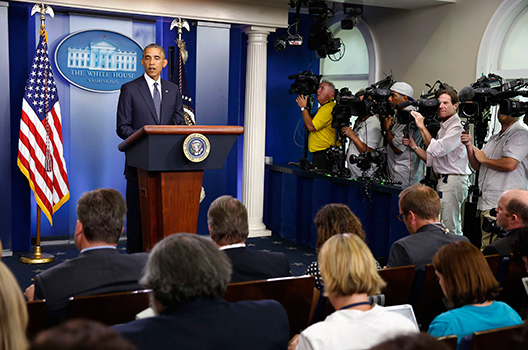
Putin Used West’s Hesitation to Escalate Kremlin’s War on Ukraine
The news that the United States has sanctioned several major Russian banks and firms, greatly limiting their use of American financial markets, is the first good news in months in terms of Western support for Ukraine. The designation of Vnesheconombank (Bank for Development and Foreign Economic Affairs), Rosneft (Russia’s largest oil producer) and Gazprombank in particular will have a major impact on the Russian economy. EU sanctions are notably weaker, but still exert a price on the Kremlin for its escalating aggression in Ukraine. The decision to stop any funding for Russian projects by the European Investment Bank and the European Bank for Reconstruction and Development will have an impact.
While welcome, these sanctions are two weeks late. In early June, the G-7 threatened Moscow with sectoral sanctions if it did not stop its interference in Ukraine within thirty days. Chancellor Merkel and President Hollande repeated this threat June 27. But on June 30, when the deadline hit, there was no talk of sanctions.
Indeed G-7 Foreign Ministers spent June 30 fecklessly trying to persuade Ukrainian President Poroshenko to continue his unilateral ceasefire, a ceasefire in which 27 Ukrainian soldiers were killed and which Moscow used to provide ten T-64 tanks, Grod missiles and scores of fighters to its insurgency in Ukraine’s East.
Mr. Poroshenko wisely ignored the urgings of his Western colleagues and resumed the military operation, successfully retaking the separatist-held cities of Savyansk and Kramatorsk. But in the process Ukraine faced increasing Russian aggression. The State Department that since the ceasefire ended, Russia has supplied at least five more T-64 tanks, at least nine armored personnel carriers, and missiles and artillery of various sorts reports. According to unofficial sources, hundreds of armored vehicles have poured across the border in this period. A Ukrainian military transport was shot down at over 20,000 feet by a sophisticated missile not known to be in the hands of the separatists in Ukraine’s East. Analysis by the website, interpretermag.com, relying on Google Earth, establishes that the missile was fired from Russian territory. All the while, the Kremlin is claiming that Ukraine has shelled Russian territory and it will respond. In a phrase, the Russia has escalated its aggression since June 30 and may even be seeking a pretext to strike Ukraine directly, and not just through thinly concealed proxies.
Since the first Western sanctions were levied, Mr. Putin has tried to use tactics that would help him destabilize Ukraine without provoking major (sectoral) sanctions. But that moment of Western weakness at the end of June gave the Kremlin strongman reason to think that he need not be so restrained. So he once again upped the ante in his campaign against an independent, democratic Ukraine.
Washington’s new sanctions will certainly give Mr. Putin pause. While better than nothing, the EU sanctions leave much to be desired. They give Mr. Putin hope that he can yet hive Europe off from the United States in this sanctions business. Washington can prevent this, not just by constant consultation and coordination with its European partners, but also by demonstrating the willingness to go it alone if that coordination does not yield the necessary result. At the end of the day, if the Obama Administration is ready to forbid the use of the dollar in transactions with key Russian financial institutions, the Europeans must go along. Even the threat of that by the Administration might prompt a more responsible European response.
John E. Herbst is director of the Eurasia Center at the Atlantic Council. He served as the US ambassador to Ukraine from 2003 to 2006.
Image: U.S. President Barack Obama speaks about Ukraine during a press briefing at the White House on July 16, 2014. REUTERS/Larry Downing
